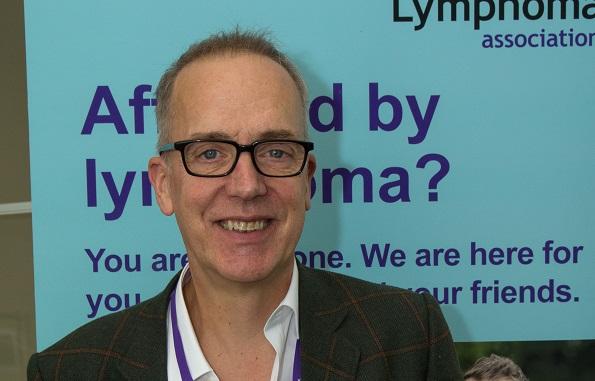Russell
How seeing the positive side of things helped Russell cope with his low-grade non-Hodgkin lymphoma

‘In November 2015 I bought my first house. I was 55 and I’d put it off for years because I’d been waiting for the supposed London property market crash which just about everyone, apart from estate agents, had been predicting. Having finally taken the plunge, I looked proudly round my proper grown-up home and said (maybe to myself, maybe out loud): “This is the house I will die in”. Three months later I was diagnosed with cancer.
Now obviously when I talked about dying I hadn’t anticipated it happening on any immediate timescale; I had planned on living through several more happy decades, enjoying a few productive middle years, possibly retiring at some point (or, as I’m self-employed, maybe just cutting down a bit on my workload), dandling grandchildren on my knee one day, pottering around in the garden - all that sort of standard stuff. But now here it was. Death had muscled its way to the front of the queue ahead of those other more pleasurable and civilised activities.
As well as being scary and slightly surreal, my diagnosis with non-Hodgkin lymphoma seemed to be profoundly unfair. I’m a vegetarian. I’ve never smoked or taken drugs. I drink in moderation. I cycle and run regularly. My parents are both alive in their 80s. All the factors indicate that I should be in a very low risk category. Yet it seemed I had wasted a load of time getting up early and going to the gym, that my carnivorous couch potato contemporaries had spent more enjoyably drinking in bars or having a lie-in. And I was the one who’d ended up with cancer.
I didn’t even have any symptoms. My diagnosis came up in a routine blood test for something else. It was a sort of existential illness: I only had my haematologist’s word for it that I was ill at all. I had to trust him; and, worse still, I had to trust him when he told me that I’d need to have chemotherapy. He’s very persuasive, so I signed up to do six months of chemo starting in July last year. That way, I reasoned, I could get it all out of the way by Christmas.
The drug I was treated with was bendamustine, which is a derivative of mustard gas. So ironically on the 100th anniversary of the Battle of the Somme I found myself in a chemotherapy ward in a North London hospital having this notorious poison drip-fed into my veins. It’s good to know that life has a sense of humour. And at least, like World War One, this grim experience would hopefully be over by Christmas.
I decided not to tell most people that I had cancer. More for their sake than mine. People don’t know what to say. Unfortunately the question “how are you?” is the prelude to just about every social interaction: when people meet you, when they call you on the phone, in emails. Even strangers greet you with it. What do you say in reply? Do you tell them you’ve got cancer straight up? Or just say breezily that you’re fine and feel you’re living a terrible lie?
The six months passed surprisingly quickly. I had a PET scan In January and was told the cancer had totally gone: 100% remission. Unfortunately the problem with my type of low-grade non-Hodgkin lymphoma is that, like a villain in a Hollywood movie of the 1980s, it tends to come back. So my priority was now to keep it at bay as long as possible. As my haematologist reminded me, there are all sorts of amazing new treatments currently in development, so the longer I can stay healthy the better the drugs that will be available when the cancer returns.
Are there any positives one can take out of having cancer? Well, actually there are. You get your problems in perspective.
Most of what we think of as problems are of a financial or emotional nature: bills, mortgages, kids, relationships. While I was doing my chemo the whole world was stressing about Brexit and Trump. But what’s the issue? Life will go on after both of them. And life going on is what it’s all about.
These days of course our lives go on much longer than they used to, thanks to all the advances in medicine and science. But all that does is give us an excuse to put things off. I’m going to live to be 120 after all. Cancer gives you that all important deadline. So when exactly are you going to do those things to change the world or your life? Write that novel? Start that business? Shall we get a date in the diary?
And despite it being a horrible random experience, there are ways in which cancer has restored my faith in life. As I mentioned earlier, bendamustine is a derivative of mustard gas. Now, mustard gas has got to be up there in the list of the top ten most evil things ever devised by human beings. But the fact that I’m still around today proves that it can also be put to a positive use. Something that was devised to destroy life can be adapted to preserve it. Good can come out of evil. That’s a nice positive thought to make me want to hang around in this world a good while longer.’
June 2018
